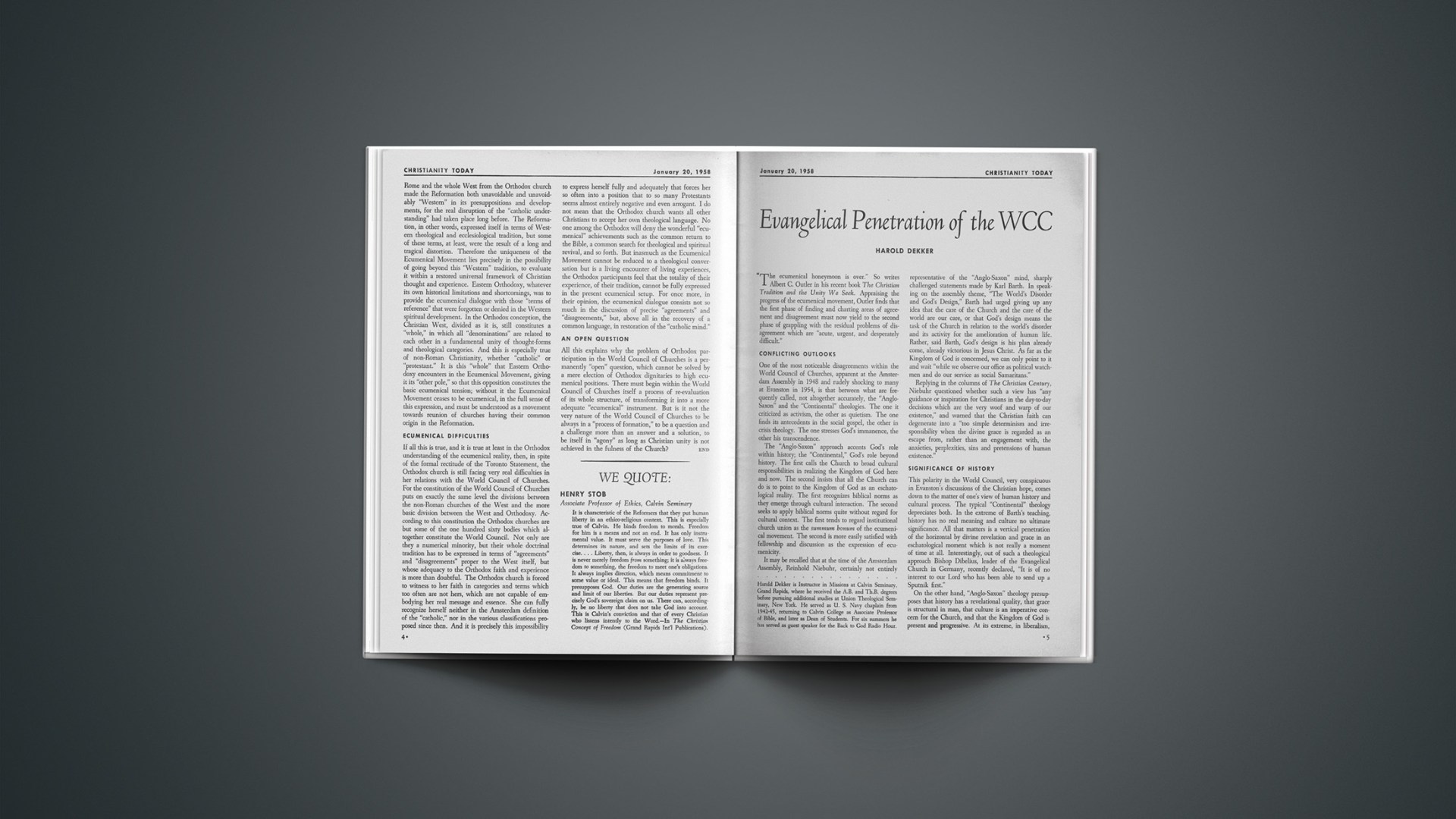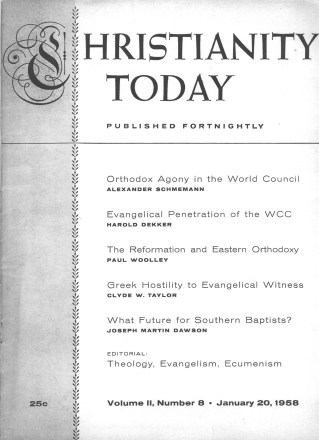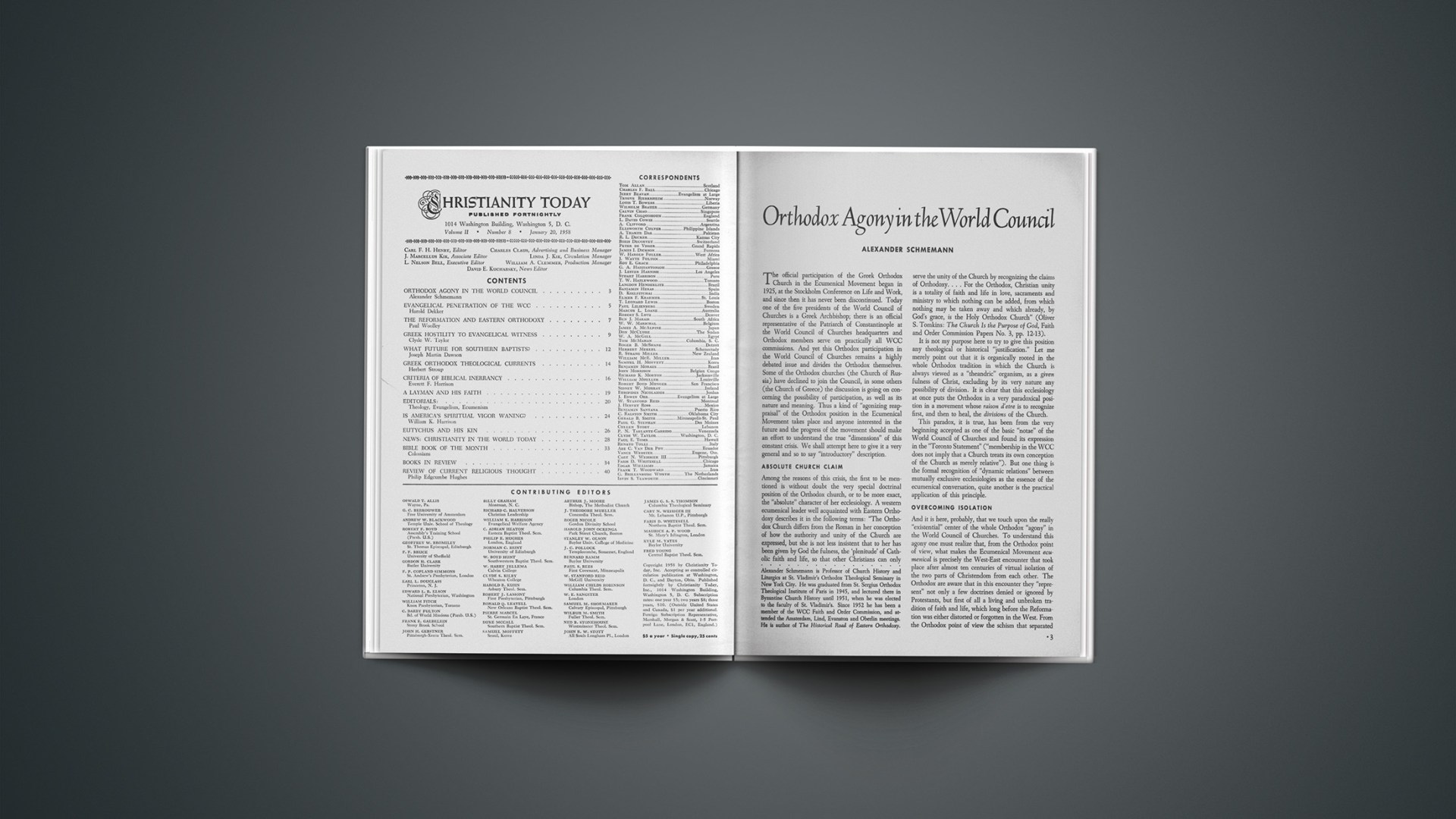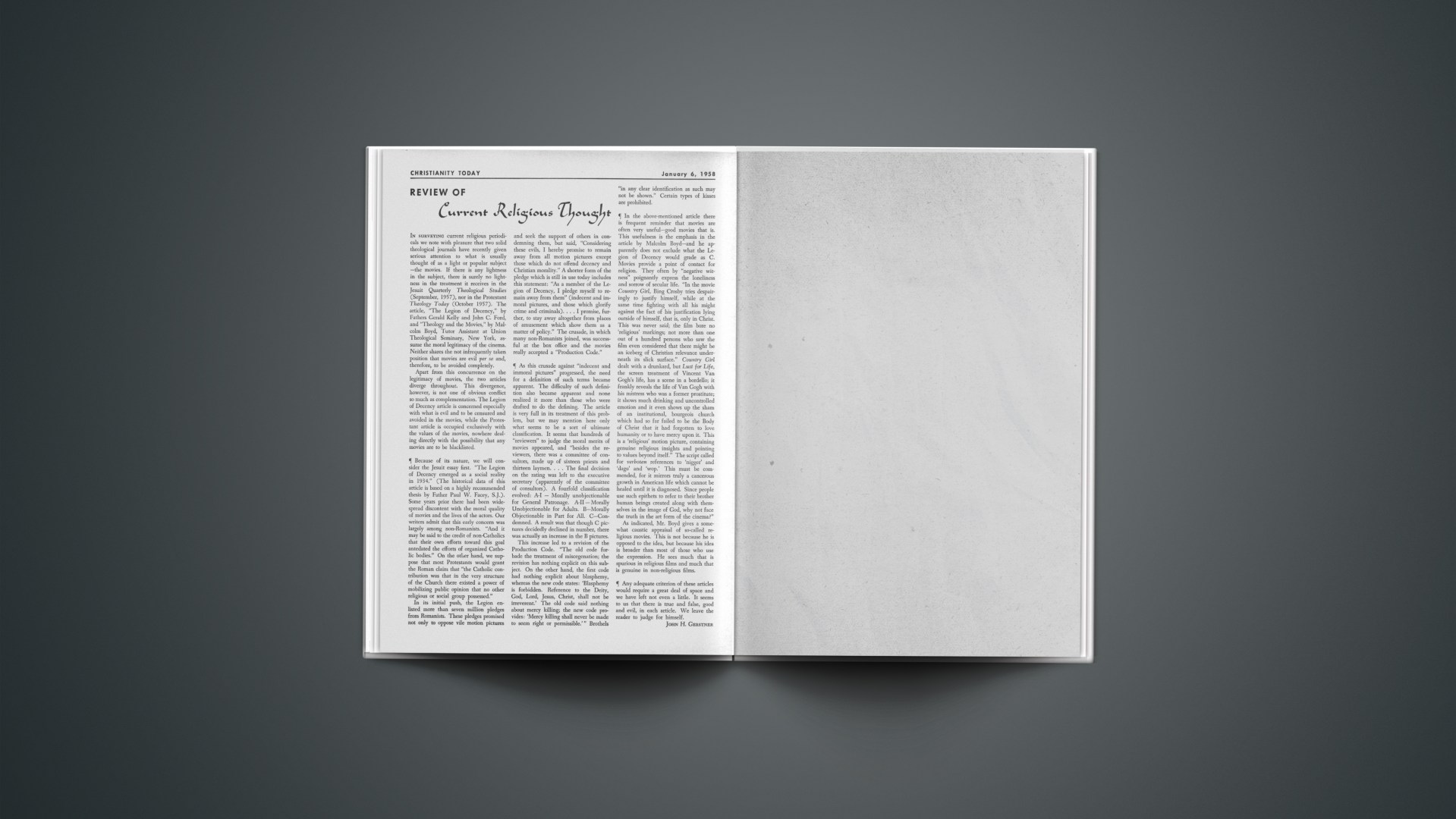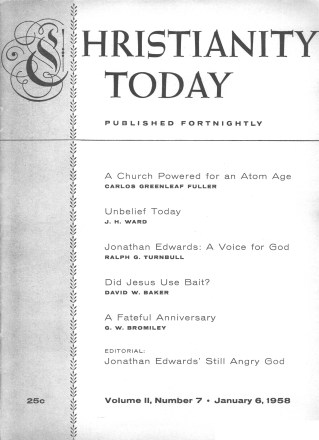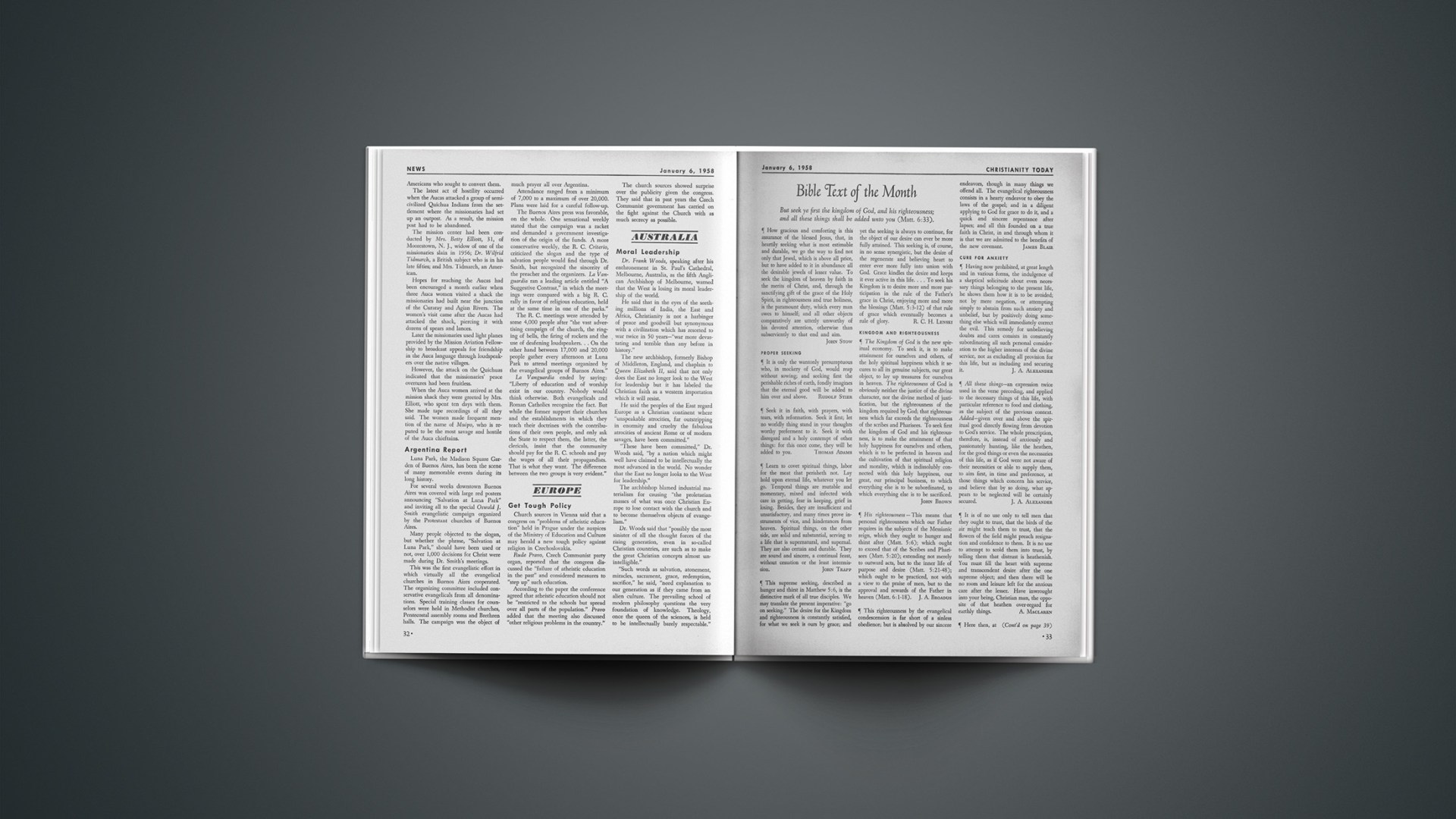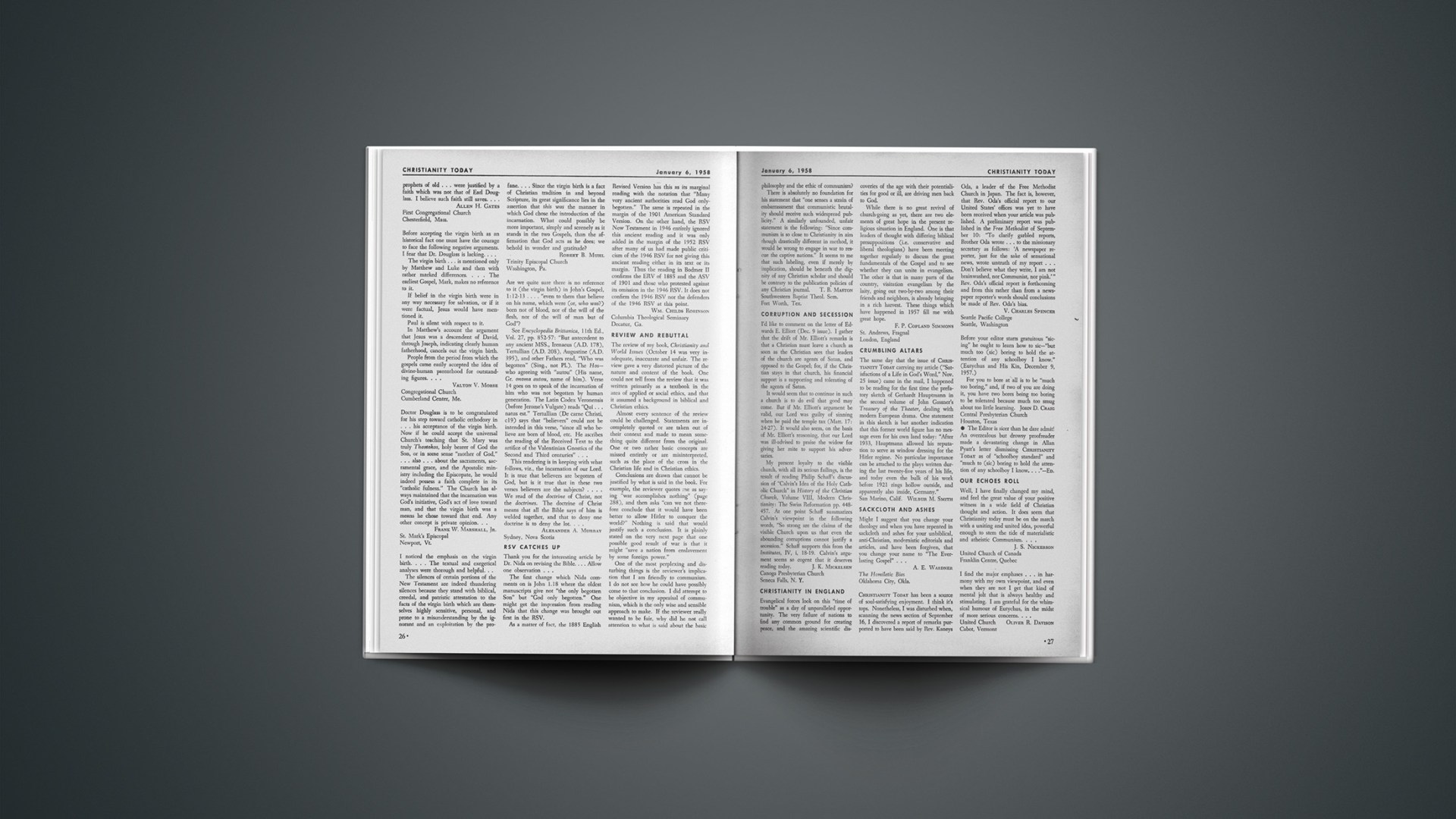The ecumenical honeymoon is over.” So writes Albert C. Outler in his recent book The Christian Tradition and the Unity We Seek. Appraising the progress of the ecumenical movement, Outler finds that the first phase of finding and charting areas of agreement and disagreement must now yield to the second phase of grappling with the residual problems of disagreement which are “acute, urgent, and desperately difficult.”
Conflicting Outlooks
One of the most noticeable disagreements within the World Council of Churches, apparent at the Amsterdam Assembly in 1948 and rudely shocking to many at Evanston in 1954, is that between what are frequently called, not altogether accurately, the “Anglo-Saxon” and the “Continental” theologies. The one it criticized as activism, the other as quietism. The one finds its antecedents in the social gospel, the other in crisis theology. The one stresses God’s immanence, the other his transcendence.
The “Anglo-Saxon” approach accents God’s role within history; the “Continental,” God’s role beyond history. The first calls the Church to broad cultural responsibilities in realizing the Kingdom of God here and now. The second insists that all the Church can do is to point to the Kingdom of God as an eschatological reality. The first recognizes biblical norms as they emerge through cultural interaction. The second seeks to apply biblical norms quite without regard for cultural context. The first tends to regard institutional church union as the summum bonum of the ecumenical movement. The second is more easily satisfied with fellowship and discussion as the expression of ecumenicity.
It may be recalled that at the time of the Amsterdam Assembly, Reinhold Niebuhr, certainly not entirely representative of the “Anglo-Saxon” mind, sharply challenged statements made by Karl Barth. In speaking on the assembly theme, “The World’s Disorder and God’s Design,” Barth had urged giving up any idea that the care of the Church and the care of the world are our care, or that God’s design means the task of the Church in relation to the world’s disorder and its activity for the amelioration of human life. Rather, said Barth, God’s design is his plan already come, already victorious in Jesus Christ. As far as the Kingdom of God is concerned, we can only point to it and wait “while we observe our office as political watchmen and do our service as social Samaritans.”
Replying in the columns of The Christian Century, Niebuhr questioned whether such a view has “any guidance or inspiration for Christians in the day-to-day decisions which are the very woof and warp of our existence,” and warned that the Christian faith can degenerate into a “too simple determinism and irresponsibility when the divine grace is regarded as an escape from, rather than an engagement with, the anxieties, perplexities, sins and pretensions of human existence.”
Significance Of History
This polarity in the World Council, very conspicuous in Evanston’s discussions of the Christian hope, comes down to the matter of one’s view of human history and cultural process. The typical “Continental” theology depreciates both. In the extreme of Barth’s teaching, history has no real meaning and culture no ultimate significance. All that matters is a vertical penetration of the horizontal by divine revelation and grace in an eschatological moment which is not really a moment of time at all. Interestingly, out of such a theological approach Bishop Dibelius, leader of the Evangelical Church in Germany, recently declared, “It is of no interest to our Lord who has been able to send up a Sputnik first.”
On the other hand, “Anglo-Saxon” theology presupposes that history has a revelational quality, that grace is structural in man, that culture is an imperative concern for the Church, and that the Kingdom of God is present and progressive. At its extreme, in liberalism, evident in the social gospel, only the horizontal has reality. There is no special grace, no supernatural revelation, and eschatology is merely a futuristic point of view on man’s autonomous progress.
Evangelical Penetration
Within this polarity of what we choose to call horizontalism and verticalism, the ecumenical movement is open to penetration by historic Christian theology. For liberalism loses the Gospel when it repudiates the supernatural, vertical intrusion of God into history, and neo-orthodoxy loses the direct relevancy of the Gospel to life when it repudiates the horizontal action of God within history. Over against both, historic Christianity insists that these are not genuine alternatives requiring a choice.
The evangelical, whether inside or outside the World Council, has a timely opportunity to witness to the integrity of both the horizontal and the vertical as planes in which God acts and speaks. The evangelical affirms both natural and supernatural revelation, both common and special grace, the Kingdom of God as both temporal and eschatological.
It may be noted in this connection that evangelicals are in peril of self-betrayal when they neglect the compelling relevancy of Christianity to all of life. Fundamentalism, for instance, has usually been quite insensitive to the Christian cultural task and distressingly unconcerned with the redemption of man’s world. It is revealing that Niebuhr, from his theological standpoint, currently challenges both Billy Graham and Karl Barth, the former to preach repentance from the sins of racial segregation and the latter to declare himself on the issue of Communism. Different though they are in many basic factors, fundamentalism and crisis theology are surprisingly alike in neglecting the social implications of the Gospel and ignoring the Christian cultural task of enthroning Christ as King in every sphere of life.
Points Of Challenge
It remains to suggest a few specific points at which the evangelical challenge, in the name of historic Christianity, may be addressed to the ecumenical movement. We cite three: revelation, the unity of the Church, and missions.
For the “horizontalist,” revelation is only natural. God is immanent and knowable in the normal course of things. Revelation is merely an empirical configuration of persons and events in which the resident divine may be discerned. On this basis the Bible is merely a record of religious experience essentially no different than other sacred writings, and Jesus Christ is a religious teacher and example not uniquely unlike many others. For the consistent “verticalist,” on the other hand, revelation is only supernatural. God and his revelation are inseparable, and since God is wholly transcendent, infinite and eternal, he cannot reveal himself directly in history which is finite and temporal. There is a radical discontinuity between God and the world. Therefore the Bible is nothing more than a human document, a pointer to God’s revelation, not itself the revelation. And Jesus is a mere man, a pointer to Christ as God, but not himself God.
Thus both “horizontalism” and “verticalism” fall short of the classic Christian view of revelation, the former in repudiating the supernatural, and the latter in repudiating the natural as media for God’s self-disclosure. There is only one way for this polarity to be transcended in the ecumenical movement. That is through the reassertion of the historic Christian view of a living God who sovereignly discloses himself in an authentically historical manner, first of all in creation and providence, and then redemptively in Christ the incarnate Word and the Bible the inscripturated Word.
Paradox Of Unity
In respect to the unity of the Church, “horizontalism” is inclined to insist on institutional unity as the irreducible aim of the ecumenical movement. Thus The Christian Century recently editorialized: “The ecumenical movement can have but one object. It is organic union.” “Verticalism,” however, is inclined to wait upon God for the fulfilment of his purpose and to be content with the unity of the Church as an eschatological reality. But why must we choose? The one suffers from historical perfectionism, the other from eschatological quietism. The one may be too optimistic, the other too pessimistic.
Today’s evangelical, with the Reformers, will acknowledge and strive for the ideal, but will also recognize that in this world of sin and error unity may come at too high a price. He will hold that the Church is in this world as the body of Christ under two aspects; as institution and as organism (mater fidelium and coetus fidelium). The one is a horizontal reality, the other a vertical. The Church must always live its life in suitable tension between these two poles, conformable to its God-given duties and opportunities.
The Missionary Debate
In the ecumenical missionary movement, too, “horizontalism” and “verticalism” emerge as alternatives. The best example of this is the famous Hocking-Kraemer debate which came to focus at the Madras Conference of the International Missionary Council in 1938. Hocking’s Rethinking Missions, reacting to the policy of radical displacement applied by many missionaries to native religions and cultures in the communication of the Christian faith, had urged the principle of continuity between all religions, that is, that Christianity is essentially no different from other religions. Differences are only in degree. This view, incidentally, had nearly prevailed at the Jerusalem Conference in 1928. Hendrik Kraemer, strongly influenced by Barth, replied to Hocking with his Christian Message in a Non-Christian World, in which he advocated the principle of radical discontinuity between Christianity and non-Christian religion, to the extent of ignoring general revelation and common grace in pagan culture and denying that there is any valid theological point of contact between the Christian message and the pagan mind.
The Madras debate, after being pushed into the background by World War II and its aftermath, is now being revived by the contemporary surge of the ancient non-Christian religions and by the publication of Kraemer’s latest work, Religion and the Christian Faith. Although the extreme of Hocking’s position has few advocates in missionary circles today, the issue between continuity and discontinuity is very much alive. And if the proposed merger between the IMC and the WCC is consummated, the larger issue of “horizontalism” versus “verticalism” will be faced in the WCC in a new dimension.
The evangelical, however, cannot accept Hocking and Kraemer as alternatives. He will not choose between continuity and discontinuity. He insists that this polarity is resolved in the presuppositions of orthodox Christianity, which posits both a horizontal general revelation in nature and human consciousness, and a vertical special revelation in the incarnation of Christ and in the Bible; and which likewise posits both a horizontal common grace by which God restrains human sin, and a vertical special grace by which he redeems man through the regenerating power of the Holy Spirit.
What the ecumenical movement needs today is to face squarely and to accept these several paradoxes of the Christian faith which are caught up in the one great paradox, that the living, sovereign, self-disclosing God is both immanent and transcendent, and that in judgment and in grace he is constantly moving within history and penetrating it from above.
Harold Dekker is Instructor in Missions at Calvin Seminary, Grand Rapids, where he received the A.B. and Th.B. degrees before pursuing additional studies at Union Theological Seminary, New York. He served as U. S. Navy chaplain from 1942–45, returning to Calvin College as Associate Professor of Bible, and later as Dean of Students. For six summers he has served as guest speaker for the Back to God Radio Hour.

